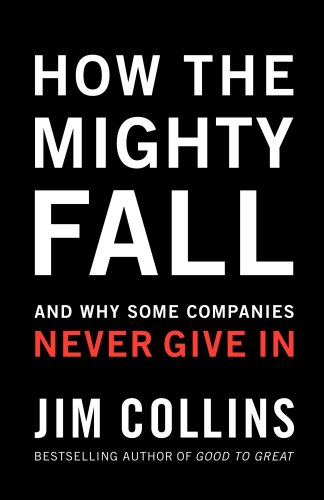Collins - How the Mighty Fall
/
Jim Collin's new book "How the Mighty Fall and Why Some Companies Never Give In" asks, "How do great companies fall? Can the decline be detected and avoided? How far can a company fall before doom becomes inevitable and unshakable? How can businesses reverse course?" Well his answers are straight forward and insightful, as so often Collins is.
Collins confronts these questions, offering hope that leaders can learn how to stave off decline and, if they find themselves falling, reverse their course. His research project requied more than four years and uncovered five stages of decline:
Stage 1: Hubris Born of Success
Stage 2: Undisciplined Pursuit of More
Stage 3: Denial of Risk and Peril
Stage 4: Grasping for Salvation
Stage 5: Capitulation to Irrelevance or Death
Decline, Collins concludes, is largely self-inflicted, and the path to recovery lies largely in each companies own hands. We are not controlled by circumstances, history, or defeats along the way.
What is most notable about the book is the meaning of the tag line: "And Why Some Companies Never Give In". For many never giving in means holding on to the status quo. Instead Collins urges leadership to be willing to kill failed business ideas even shuttering long time big operations; to evolve into entirely different activities a part from present operations; to be willing to embrace loss and temporarily lose freedoms; to be willing to form alliances with former adversaries. “Never give in” is not continuing the same things. It means identifying that success is falling down and getting up one more time without end. Businesses must be willing to change in a disciplined fashion in order to survive, and there are many examples in this excellent book.
Check out Collin's video below as he outlines the five stages to decline identified in the book.






